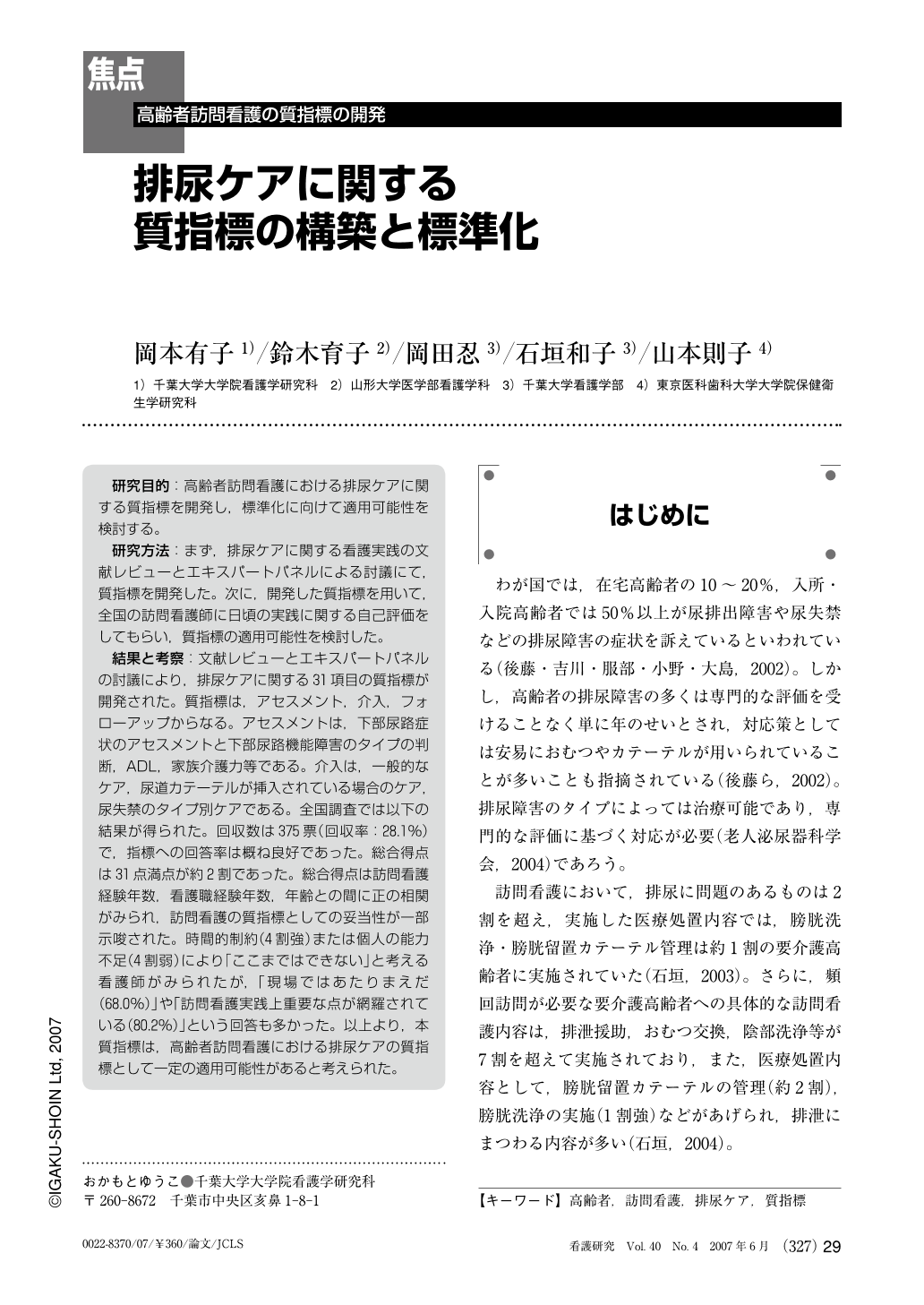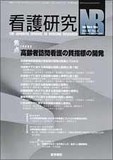Japanese
English
- 有料閲覧
- Abstract 文献概要
- 1ページ目 Look Inside
- 参考文献 Reference
- サイト内被引用 Cited by
研究目的:高齢者訪問看護における排尿ケアに関する質指標を開発し,標準化に向けて適用可能性を検討する。
研究方法:まず,排尿ケアに関する看護実践の文献レビューとエキスパートパネルによる討議にて,質指標を開発した。次に,開発した質指標を用いて,全国の訪問看護師に日頃の実践に関する自己評価をしてもらい,質指標の適用可能性を検討した。
結果と考察:文献レビューとエキスパートパネルの討議により,排尿ケアに関する31項目の質指標が開発された。質指標は,アセスメント,介入,フォローアップからなる。アセスメントは,下部尿路症状のアセスメントと下部尿路機能障害のタイプの判断,ADL,家族介護力等である。介入は,一般的なケア,尿道カテーテルが挿入されている場合のケア,尿失禁のタイプ別ケアである。全国調査では以下の結果が得られた。回収数は375票(回収率:28.1%)で,指標への回答率は概ね良好であった。総合得点は31点満点が約2割であった。総合得点は訪問看護経験年数,看護職経験年数,年齢との間に正の相関がみられ,訪問看護の質指標としての妥当性が一部示唆された。時間的制約(4割強)または個人の能力不足(4割弱)により「ここまではできない」と考える看護師がみられたが,「現場ではあたりまえだ(68.0%)」や「訪問看護実践上重要な点が網羅されている(80.2%)」という回答も多かった。以上より,本質指標は,高齢者訪問看護における排尿ケアの質指標として一定の適用可能性があると考えられた。
The purpose of this study was to develop and standardize quality indicators (QIs) for the care of lower urinary tract dysfunction (LUTD) in home nursing for aged. First we developed the QIs based upon the literature review and expert panel consideration. Secondly, we conducted a national survey using the QIs in order to assess their applicability. Nurses were asked to answer each QI based on their clinical experiences. As a result, 31 QIs were developed. Indicators related to the assessment included assessing the symptoms of LUTD, activies of daily living, family/caregiver situation, etc. Indicators related to intervention included general care, specific care, care when a urinary catheter is used, etc. There were also indicators related to follow-up. In the national survey, 375 (28.2%) out of 1330 nurses who received the QIs responded. There were only a few “no answers.” The average score was 26.3 (SD=4.1). Seventy-three (19.5%) nurses yielded a perfect score. The score was moderately but not significantly related to the length of career as a home nurse (0.20 ; p<0.01), the length of career as a nurse (0.16 ; p<0.01), and age (0.12 ; p<0.05). Approximately 40% of nurses reported that many of the QIs were difficult to achieve due to lack of time or knowledge. On the other hand, 68.0% of nurses reported that many QIs were easy and common in their practice. The majority 80.2% of nurses reported that the QIs covered major important aspects of clinical practice. Most nurses stated that overall the QIs were very applicable. The association between QI score and the age and the length of career as a nurse might show certain aspects of validity of the QIs. The association between QI score and the length of career as a home nurse might also reflect their validity in a home nursing. Further research is necessary to assess the utility of the QIs.

Copyright © 2007, Igaku-Shoin Ltd. All rights reserved.


